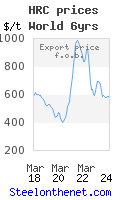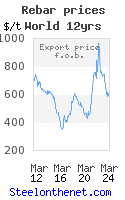Why coal-rich US is seeing record imports: They've jumped from 9 million tons to 30.5 million tons since 1999, as demand grows for low-sulfur coal.With nearly a quarter of the world's coal supply - enough to last centuries - the United States has been dubbed the 'Saudi Arabia of Coal' by US officials and energy experts.
But thanks to growing global coal markets and clean air regulations, the US is witnessing a latter-day equivalent of 'carrying coals to Newcastle' - a 230 percent leap in coal imports to the US since 1999.
Coal-fired power plants along the Gulf Coast and East Coast have long imported coal by ship in small amounts. But with transportation costs and the price of low-sulfur coal from central Appalachia and Wyoming rising, US demand is soaring for coal from South America and as far away as Indonesia.
Leaping from 9 million tons to 30.5 million tons in the past six years, US coal imports could jump to 40 million tons this year, government analysts say. And that trend is accelerating as demand for low-sulfur coal grows following last year's federal Clean Air Interstate Rule, a mandate for big cuts in sulfur dioxide emissions from power plants in the eastern US.
At the same time, US coal exports are declining sharply. If present trends continue, the US will be a net importer of coal by 2013, according to the Energy Information Administration of the US Department of Energy. Still, most analysts see little need to worry since vast US reserves mean the US is unlikely to become dependent on overseas coal.
'Its truly an ironic situation with the growth in imports, but in the bigger picture, there's no need to worry' says Richard Bonskowski, a coal analyst at the Energy Information Administration. The US produced more than 1.1 billion tons of coal last year, he says. So the US is importing only 4 percent of US consumption.
The electric power industry consumes more than 90 percent of all coal burned in the United States. Most imported low-sulfur coal comes from Colombia, Venezuela, and even Indonesia. Some US companies like Peabody Energy, of St. Louis, which owns a stake in a Venezuelan mine, and Drummond Coal, of Birmingham, Ala., which operates a Colombian mine are top importers.
Alabama Electric Cooperative, which operates several coal-fired power plants, has long imported some low-sulfur coal from South America. Recently, however, it boosted imports with 220,000 tons from Venezuela.
Tighter air pollution regulations are hiking demand for low-sulfur coal from the Powder River Basin in Wyoming. But a spokesman for CPS Energy of San Antonio, says the company imported 150,000 tons of coal from Colombia because of rail delivery problems of the powder-river coal.
South American coal has found its way as far up the East Coast as Salem, Mass., where Dominion Resources, based in Richmond, Va., operates a coal-fired power plant that uses low-sulfur coal to meet emissions goals.
Energy security experts say the rapid rise of coal imports is not a big problem, because many other alternatives exist for power generation. Nuclear energy, natural gas, and domestic coal can all substitute if prices for imported coal rise too high.
That's different from the problem of US oil consumption in which the nation each year consumes about a quarter of the global supply, but has only 3 percent of global reserves, says Gal Luft, executive director of the Institute for the Analysis of Global Security in Washington, a think tank focused on energy security issues.
'If we have our back to the wall, we can always fall back on the coal reserves we have here in this country' he says.
blogger@steelonthenet.com



